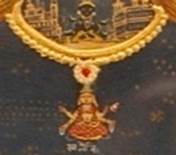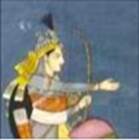
Part I
Bhagavad Gita XVIII.55 / Reaching Union in Love
By Loving Me (the One) is born
The Reality of who I am, how great,
Then having Known Me in Truth
One enters into Me immediately, at once!
Bhaktya mam abhijanati
Yavan yashcasmi tattvatah
Tato mam tattvato jñatva
Vishate tadanantaram
Bhakti Yoga, Jñana Yoga & Karma Yoga
The final chapter XVIII of the Bhagavad Gita is a summing up of all the other
chapters. Verse 55 refers to the Yoga of Devotion or simply Loving God, which is
the subject of Chapter XII — and my favourite. The Bhagavad Gita teaches that
all three aspects of attaining Wisdom are important and in fact interwoven. You
need Wisdom-Knowledge, Jñana Yoga (from the root jña = to know) in order to
understand why you Love God. Acts, Karma Yoga, that cultivate God-Consciousness
emerge as the result of both Wisdom-Knowledge, Jñana Yoga and Bhakti Yoga,
Devotion.
Love is the underlying principle that generates the universe. The Love of the
Creator for all of Its creation supports and sustains our each and every moment
in illusory Time. In countless lives we have experienced some form of love,
whether it be for another human being, a beloved pet, or even an idea as music
or art. What we learn from these experiences is that our love has the power of
to hold our focused attention. With no effort whatsoever we are spontaneously
able to think of the object of our love throughout the day and night. If you
translate this intensity of concentration into the journey toward enlightenment,
you can easily understand how valuable a state of Love is to reaching Home.
I have a cherished friend who once asked me to tell him the essence of the
Sanskrit texts. What did the ancient Seers, the Rishis know. At the time I was
deep in the somewhat daunting challenge of learning the numerous Sanskrit terms
used in the Kashmir Shaivite approach, which are very complex and require a
dedicated concentration. I knew he was not ready to be open to that sort of
application — yet. So knowing what he would most definitely indeed understand, I
said smiling, “Love God!”

“Devotion, yes… jñana is nothing before devotion.”
Love for God, the One, is of primary importance also in Kashmir Shaivism. The
Kashmir Shaivite saint and scholar, Swami Lakshmanjoo reveals the meaning of the
above Verse XVIII.55: “By that bhakti (devotion), by that supreme bhakti, which
is real bhakti, you will understand Me, who I am, how much I am and how long I
am, how great I am, how broad I am, and how I am broad, and [even] more than
that actually. …then you will get entry into that union with Me.
Vishate tada,
you will undergo, you will melt in that oneness.”
Real
bhakti
is not an outward show of sentiment. Supreme
bhakti
happens within the Silence of our own Heart. Love for God is a private matter,
just as two lovers can never successfully convey to others the subtle intimacies
of their union, our union with the God-within is too subtle and sacred, too
mystical to be felt and known by any other than you and God. Mystics hint at
their ecstatic rapturous experiences in poetry, but words remain incomplete,
incapable of carrying the divine frequencies felt in such experiences. We become
attached to Loving the One everywhere.
Swami Lakshmanjoo says that in Kashmir Shaivism the idea of non-attachment is
not recognized in the sense of ‘attachment’ to Lord Shiva [as God is termed in
Kashmir Shaivism], the Oneness, the God-within, whatever name we call the One
who is nameless — rather this form of attachment to God is the highest Wisdom,
because everything in this world is divine, in Truth radiating the light of
God-Consciousness. “When you believe that this whole, whatever is existing in
this universe, in all these one hundred and eighteen worlds, whatever is
existing is for the sake of Lord Shiva, who is only existing [meaning the only
being, thing that ever does exist], when this is done, then there won’t be
any…fruits [of your acts, your karma].”

Swami Muni Narayana Prasad says there are two ways of knowing any thing. One way
is to know from the outside, as an observer. The other way is as “the knower
knowing Reality as the essential content of his own being.” When our
consciousness enters into the God-within, we Become That. It is rather like this
— let us say that there is a vessel, a cup of liquid Light residing in our
Heart, the heart chakra. When we reach a similitude, a similarity in frequency
with that cup of Light, it begins to expand and overflow into and throughout our
entire being until none of our old false temporal small-identity self remains.
The God-within is a gentle tsunami that permeates our previous consciousness,
enlightening us in the Remembrance of our Real identity.
Swami Muni Narayana Prasad says even though this illumination fills our being
with blissful serenity, we are still faced with life’s vagaries, Hamlet’s
infamous slings and arrows of outrageous fortune. However having Become the
God-within, or Brahman (as he terms it), these vagaries no longer cause us to
grieve. Wise men do not grieve! We face life with the “boldness of being
Brahman. What guides his life is not aspiration for personal benefits, but the
joy of partaking of the overall flow of karmas of Prakriti.” In others words,
the cyclical flow of the temporal illusory holographic universe is awesomely
Joy-filled, when viewed from the eyes of the One within. We see the Oneness
everywhere, ubiquitous in All, everyone and everything.

Place the mind in the Heart Chakra
K.K. Nair/Krishna Chaitanya places emphasis on the idea that the author of the
Bhagavad Gita, Krishna Dvaipayana Vyasa has intently conceived the path of
Devotion, Bhakti Yoga, as one that requires balance. Through the voice of
Krishna, who is speaking as the One, the poet seer Vyasa “has taken enormous
care to ensure that devotion does not degenerate into mere emoting. …maintaining
a triadic integration and consistency — of feeling thought and will.” We are
reminded of a previous verse Bh.G.VIII.12, in which Krishna instructs Arjuna to
place the mind in the Heart chakra; the Sanskrit word used is
nirudhya,
meaning to confine, suppress, or shut up. Such confinement of the mind in Heart
requires great mastery of focused concentration. Our Love for God can produce
this kind of one-pointed focus.
The sage Seers, the Rishis who composed the hymns in the Rig Veda, do not speak
as the One. They speak in praise of That which is ever mysterious, perhaps even
unknowable. The Rishis speak in adoration as observers seeking Truth,
Wisdom-Knowledge understanding, Agni as the Fire of Union. They enumerate the
aspects of the One as various deities, Agni, Indra, Vayu, Savitri, Surya,
Varuna, and others (who esoterically reside within the body). The Seers who
composed the later Upanishads, which seek to elucidate, make comprehensible the
Rig Veda, also did not speak as the voice of the One.
Vyasa frequently uses passages, sometimes even direct quotes from the
Upanishads. Therefore the poet sage Vyasa lived later than these earlier
Sanskrit texts. Vyasa's poetic creation of the character Krishna in the epic
Mahabharata is said to be based on an actual warrior hero, a black man, meaning
very dark skin, who was very popular in South India. The literal meaning of the
Sanskrit word Krishna is 'black'. Vyasa used his Krishna as the voice of the
One.
In his book on the Mahabharata, K.K. Nair/Krishna Chaitanya says this regarding
Vyasa’s Krishna: “Vyasa has created him [Krishna in the Mahabharata & Gita]
essentially as a man who participates with other men in the action of history.
To act meaningfully in the world, one has to have a view about its origin and
purpose. Vyasa’s profound views on these are expressed through Krishna.” In
other words, Krishna is the voice of the brilliant genius sage, seer, and poet
Vyasa. God is in all men. India expresses this in the idea of avatar. God speaks
through many.
“To give these views the ring of antique insights, Vyasa uses the daring
mythopoeic strategy of making Krishna speak as the voice of deity, the
intentionality behind creation, in the Gita discourse. Krishna should not be
taken more seriously, nor less seriously either, than the prophets known to
history through whom God is believed to have spoken. …Vyasa’s temperament is not
religious as such…Vyasa was probing the riddle of existence through the modality
of poetry, which is perhaps more profound…” [quoted from ‘The Mahabharata, A
Literary Study’ - Krishna Chaitanya].

Eternal Vigilance
The path Home is accurately described as The Razor’s Edge, and a balance must be
continually sought between devotional Love (bhakti), Knowledge (jñana) the mind,
and our acts (karma). As Thomas Jefferson so wisely said, 'The price of Freedom
is eternal vigilance.' We must not lose our way, again sliding down into the
abyss of delusion. K.K. Nair/Krishna Chaitanya in his book “The Betrayal of
Krishna” enumerates the excesses that have occurred over the centuries as
Vyasa’s Krishna in the Mahabharata and the Bhagavad Gita was transformed into
something quite different by the court poets and the later Bhagavata Purana, as
Krishna was reinvented and recreated to suit their requirements and conceptions.
Even though the Bhagavad Gita has been extracted for convenience as an external
distinct book, it is pivotal to the greater epic and Vyasa’s knowledge of
primordial metaphysics are to be found throughout the Mahabharata, especially in
the Moksha Dharma Parvan, the Book of Liberation.
K.K. Nair/Krishna Chaitanya
states that Vyasa chose the form of a poem for a meaningful reason. Krishna’s
teachings are not in the format of a dogmatic treatise or philosophical
argument. Krishna speaks in Sanskrit rhyme and thus belongs to the world of
poetry and aesthetics, and not a particular creed or denomination. According to
K.K. Nair/Krishna Chaitanya,
Vyasa’s genius was rational and therefore, beyond and totally against cultism.

Bhagavad Gita, In the Light of Kashmir Shaivism, with original video, Revealed
by Swami Lakshmanjoo, Edited by John Hughes, Co-editors Viresh Hughes and Denise
Hughes; Universal Shaiva Fellowship, 2013.
The Gita for Modern Man, by Krishna Chaitanya; Clarion Books, Associated with
Hind Pocket Books, New Delhi, 1986, 1992.
KRISHNA CHAITANYA, A Profile and Selected Papers; Edited by Suguna Ramachandra;
Konark Publishers Pvt. Ltd., Delhi, 1991.
Life’s Pilgrimage Through The Gita, by Swami Muni Narayana Prasad; D.K.
Printworld, New Delhi, 2005, 2008.
The Bhagavad Gita in the Mahabharata, A Bilingual Edition, translated by J.A.B.
van Buitenen; The University of Chicago Press, 1981.
The Bhagavad Gita, translated by Winthrop Sargeant; State University of New York
Press, 1994.
Abhinavagupta’s Commentary on the Bhagavad Gita, Gitartha Samgraha, translated
by Boris Marjanovic; Indica Books, Varanasi, 2002, 2004.
The Betrayal of Krishna, Vicissitudes of a Great Myth
Krishna Chaitanya/K.K. Nair
Clarion Books, 1991, New Delhi
The Mahabharata, A Literary Study, by Krishna Chaitanya [K.K. Nair]; Clarion
Books, Delhi, 1985, 1993.

|
Questions
or comments about articles on this site: |
Copyright© V. Susan Ferguson |
Technical questions or
comments about the site: |
|
|